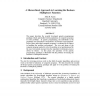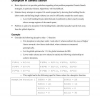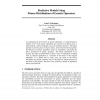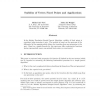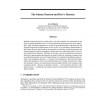FOGA
1992
15 years 3 months ago
1992
There has been a lot of recent interest in so-called "steady state" genetic algorithms (GAs) which, among other things, replace only a few individuals (typically 1 or 2)...
118
click to vote
FOGA
1992
15 years 3 months ago
1992
The building-block hypothesis states that the GA works well when short, low-order, highly-fit schemas recombine to form even more highly fit higher-order schemas. The ability to p...
131
click to vote
FOGA
1990
15 years 3 months ago
1990
This paper describes the recently developed genetic programming paradigm which genetically breeds populations of computer programs to solve problems. In genetic programming, the i...
103
click to vote
FOGA
1990
15 years 3 months ago
1990
This paper considers a number of selection schemes commonly used in modern genetic algorithms. Specifically, proportionate reproduction, ranking selection, tournament selection, a...
FOGA
1990
15 years 3 months ago
1990
FOGA
1990
15 years 3 months ago
1990
105
click to vote
FOGA
1994
15 years 3 months ago
1994
An important goal of the theory of genetic algorithms is to build predictive models of how well genetic algorithms are expected to perform, given a representation, a fitness lands...
118
click to vote
FOGA
1994
15 years 3 months ago
1994
In the Infinite Population Simple Genetic Algorithm, stability of fixed points is considered when mutation is zero. The analysis is based on the spectrum of the differential of th...
122
click to vote
FOGA
1994
15 years 3 months ago
1994
Holland's Schema Theorem is widely taken to be the foundation for explanations of the power of genetic algorithms (GAs). Yet some dissent has been expressed as to its implica...
123
click to vote
FOGA
1996
15 years 3 months ago
1996
While bit-based, order-based and real-valued genetic algorithms have been wellstudied in the literature, the xed-length subset representation has received relativelylittle attenti...

